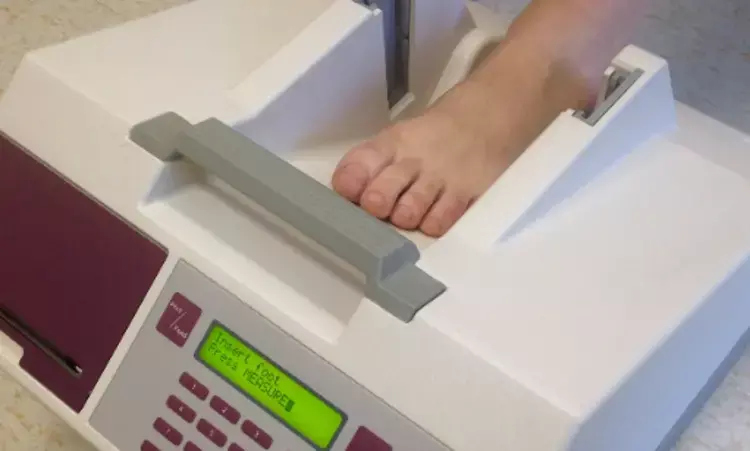- Home
- Medical news & Guidelines
- Anesthesiology
- Cardiology and CTVS
- Critical Care
- Dentistry
- Dermatology
- Diabetes and Endocrinology
- ENT
- Gastroenterology
- Medicine
- Nephrology
- Neurology
- Obstretics-Gynaecology
- Oncology
- Ophthalmology
- Orthopaedics
- Pediatrics-Neonatology
- Psychiatry
- Pulmonology
- Radiology
- Surgery
- Urology
- Laboratory Medicine
- Diet
- Nursing
- Paramedical
- Physiotherapy
- Health news
- Fact Check
- Bone Health Fact Check
- Brain Health Fact Check
- Cancer Related Fact Check
- Child Care Fact Check
- Dental and oral health fact check
- Diabetes and metabolic health fact check
- Diet and Nutrition Fact Check
- Eye and ENT Care Fact Check
- Fitness fact check
- Gut health fact check
- Heart health fact check
- Kidney health fact check
- Medical education fact check
- Men's health fact check
- Respiratory fact check
- Skin and hair care fact check
- Vaccine and Immunization fact check
- Women's health fact check
- AYUSH
- State News
- Andaman and Nicobar Islands
- Andhra Pradesh
- Arunachal Pradesh
- Assam
- Bihar
- Chandigarh
- Chattisgarh
- Dadra and Nagar Haveli
- Daman and Diu
- Delhi
- Goa
- Gujarat
- Haryana
- Himachal Pradesh
- Jammu & Kashmir
- Jharkhand
- Karnataka
- Kerala
- Ladakh
- Lakshadweep
- Madhya Pradesh
- Maharashtra
- Manipur
- Meghalaya
- Mizoram
- Nagaland
- Odisha
- Puducherry
- Punjab
- Rajasthan
- Sikkim
- Tamil Nadu
- Telangana
- Tripura
- Uttar Pradesh
- Uttrakhand
- West Bengal
- Medical Education
- Industry
Calcaneal Ultrasound Shows Promise in Fracture Risk Assessment for Type 2 Diabetes Patients: Study

A recent study published in Clinical Endocrinology explores the usefulness of calcaneal quantitative ultrasound (QUS) as a tool for long-term fracture risk assessment in individuals with diabetic osteopathy, particularly those with type 2 diabetes mellitus (T2DM). While traditional methods like bone densitometry and commonly used fracture risk algorithms often lack reliability in diabetic patients, QUS offers a promising, non-invasive and low-cost alternative that has already proven effective in primary osteoporosis.
The study aimed to determine whether calcaneal QUS could provide accurate estimates of fragility fracture risk over a decade. Researchers reviewed records from 300 patients with either type 1 (T1DM) or type 2 diabetes who underwent calcaneal QUS testing in 2013. This evaluation included measurements of broadband ultrasound attenuation (BUA), speed of sound (SOS), and stiffness index (SI), along with patient histories of clinical fragility fractures and diabetes-related characteristics.
Ten years later, patients were contacted for a follow-up interview to report any new clinical fragility fractures experienced between 2013 and 2023. The study found that patients who had fractures-both at the beginning and during the follow-up period-tended to have lower QUS values. In particular, BUA was found to be associated with the development of major osteoporotic fractures over ten years in patients with type 2 diabetes, reinforcing its potential role in long-term fracture risk prediction.
This association was not observed in patients with type 1 diabetes.
Overall, the findings suggest that calcaneal QUS could serve as an effective tool for evaluating fracture risk in individuals with type 2 diabetes, providing a valuable addition to current clinical practices where traditional assessment methods may fall short.
Dr. Shravani Dali has completed her BDS from Pravara institute of medical sciences, loni. Following which she extensively worked in the healthcare sector for 2+ years. She has been actively involved in writing blogs in field of health and wellness. Currently she is pursuing her Masters of public health-health administration from Tata institute of social sciences. She can be contacted at editorial@medicaldialogues.in.
Dr Kamal Kant Kohli-MBBS, DTCD- a chest specialist with more than 30 years of practice and a flair for writing clinical articles, Dr Kamal Kant Kohli joined Medical Dialogues as a Chief Editor of Medical News. Besides writing articles, as an editor, he proofreads and verifies all the medical content published on Medical Dialogues including those coming from journals, studies,medical conferences,guidelines etc. Email: drkohli@medicaldialogues.in. Contact no. 011-43720751


